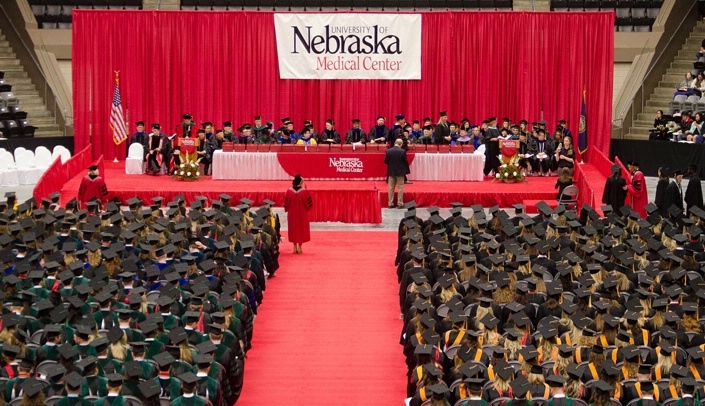On Saturday, we will award medical degrees to the Class of 2019.
The process of becoming a physician is certainly not easy. The first step – getting into medical school – is highly competitive and only the best of the best are selected. For the next four years, medical students are consumed as they work to master the complex world of medicine. It’s a rigorous journey filled with lots of late-night studying, pressure-filled exams, and reflective moments. Ultimately, they must decide upon their future specialty within medicine and successfully navigate the residency match process.
In spite of all these challenges and the unprecedented length of the training required, speaking as someone who is far closer to the end of his career than the beginning, being a physician remains an incredible profession. No other career allows you to impact people one-on-one quite like that of a physician. There is nothing like it. The decisions made can be the difference between life and death, and the relationships forged between patients and doctors are a special bond grounded in trust.
As we prepare to send the Class of 2019 on to their residency training, we have hopefully prepared them to not only practice medicine in today’s environment of health care, but also in the future.
How will medicine of the future look for these young men and women? In no particular order, here are some of the things that may lie ahead for them:
- Technology and artificial intelligence will dramatically change the way medicine is practiced. Anything that can be digitized and read by a computer will be impacted. This means X-rays, pathology slides and skin lesions as abnormalities will likely be able to be read more accurately by the computer than by physician.
- Maximizing the efficient use of such technology should allow physicians to spend more time with their patients and build a strong, interpersonal relationship.
- Smartphone apps and remote monitoring technologies will allow health professionals to track blood pressure, blood sugar, sleep patterns, heart rate, calorie intake and much more. This holds exciting possibilities for how we are able to monitor diseases such as congestive heart failure or chronic conditions such as diabetes or assist a patient who is isolated at home and feeling depressed.
- Doctors will use electronic devices to improve their communication with patients.
- Simulation capabilities will transform surgery by allowing surgeons to simulate and practice an upcoming surgical procedure in a patient-specific manner prior to performing the actual surgery.
- 3-D printing capabilities will be used to create patient-specific prosthetic devices and be used in reproducing organs in the body.
- Patients will increasingly have their care managed by interprofessional teams including physicians, nurses, social workers, pharmacists and physical therapists.
- The patient-centered medical home concept will continue to grow.
- Compensation will be a bundled payment system. Health care teams will be reimbursed based on quality incentives or disincentives (e.g. keeping patients healthy and out of the hospital rather than by volume of care provided).
- Patients and care providers will reflect the growing diversity of our country and health care providers will need greater culture competency, i.e. expertise and understanding of the culture of their patients and how that relates to their health care needs and outcomes.
- Under this model, physicians will need to become more creative in administering care. Increasingly, patient interaction will not be in the hospital, but in the outpatient setting, and will include such tools as video conferencing, email, and personalized or virtual home visits.
- An increasing percentage of hospitals beds will be devoted to intensive care, with an increasing amount of care moved to the ambulatory or short stay setting.
- Electronic medical records will not go away and will take on a level of interoperability that will allow care providers and patients to have ready access to a lifetime of a patient’s medical care.
Some of the above will hopefully decrease the demand on physician time and lessen current frustrations. However, medicine will remain a demanding field. Thankfully, UNMC and other medical schools are realizing the importance of work-life balance and are striving to convey this message to our students. Physicians work long hours and should be dedicated to their patients, but it is absolutely essential that they carve out time for their own personal wellbeing.
Each year, about 300 physicians commit suicide – that’s more than just about any profession. It’s a scary statistic. Yet, most people have no idea that this is the case.
I was pleased that about 130 physicians, residents, students and alumni attended the recent screening of the "Do No Harm" film at UNMC. The film asks the question: "What’s killing our doctors." It is a controversial film that brings the issue of work-life balance front and center.
I was equally pleased that the Omaha World-Herald carried a feature story on April 18 on the Nebraska Medical Orchestra. This is a perfect example of how UNMC is working to provide new outlets to help balance the lives of our health professionals. My gratitude goes out to Drs. Steve Wengel and Matt Rizzo, who were instrumental in making the orchestra happen.
As the school year comes to another successful close, I want to express my thanks to all the College of Medicine faculty and staff for their ongoing efforts in this vital enterprise. I encourage all of you to enjoy the next several months of warmth, as we look forward to many exciting successes in the coming academic year.
